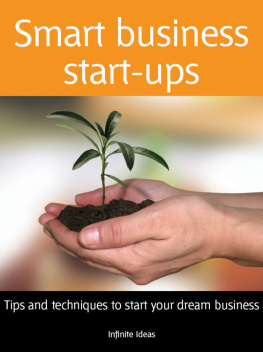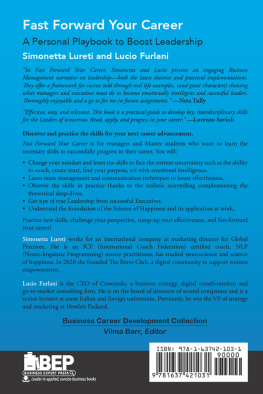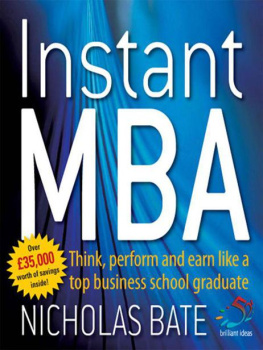MBA
10 instant MBA lessons
Infinite Ideas with Nicholas Bate

Successful consultancy
One of the reasons you may be doing an MBA is to become a consultant, maybe internal, maybe external. Heres how to start a consultancy which is high-end and successful. Follow the guidance and you can make it happen: five stages to success.
It doesnt really matter whether its your own business, or whether its a department within an organization. Now, for ease of description, well assume you are starting your own external consultancy. But remember the same thinking essentially applies if you are attempting to turn your HR department into an internal HR consultancy exactly the same thinking. You should feel confidant that you can answer the question If we were to outsource, would we survive? with a very positive Yes!
Stage 1: whats its purpose?
Today is the day to get clear. Why do you want to start your own business and, in particular, why do you want to start a consultancy? Be honest: is it for the money? Thats fine, of course. To change the world? To have more free time? You need to be clear, though how much money? Change the world in what way? How much free time and for what purpose? Get clear; get explicit. Now, ask yourself again why you really want to do it.
Now answer this question: how will you position it as a premium consultancy? What will be special about it? Are you now clear on your purpose? Successful entrepreneurs tend to have purpose and they tend to have clarity of purpose. Now document and/or draw your purpose and put it somewhere you will see it every day, both now while you are planning and eventually while you are running the business. If you are running an internal consultancy, these questions are just as crucial.
Stage 2: why is it different?
To do more than just survive, to make money and to have a comfortable lifestyle, you must be distinct. The bottom line is be distinct or be extinct. So, why would anyone want to buy from you? The answer (we hope) is not because you offer the lowest prices; no, you have something special. But heres the irony: if you do have anything special whether thats a widget or a methodology it wont stay special for very long. So, your secret weapon is to be distinct on your service and responsiveness. Do not ignore that aspect. You must have something which is unique about you; if not, you will just be selling on price. Start work now on what your unique selling propositions are.
Stage 3: whats the plan?
In particular, have you done your gap analysis? You need a plan to take you from where you are now to where you want to be. Try answering these questions: Why would anyone buy your product? What problem are you solving? What is the price for your services? (That seems expensive! How do you justify that?) Do you know how to create an invoice or chase for payment? Could you confidently do a pitch for new business? What is your marketing budget? What will you use it for? Can you manage a cash flow or motivate a team? Document your plan now.
Stage 4: getting better all the time!
Your business is up and running; youve got customers and clients. What do they like about you? What do they love about you? What really annoys them? Document and improve, constantly and continuously. Get better all the time.
Stage 5: success is a journey.
Youre on the way, but you are actually never there. Regularly take time out to review the above questions and reinvent your business. Remember that your biggest blocker to long-term success is, ironically, your current success.
Heres an idea for you
You may not like it, but you know that programme Dragons Den? Present your idea to an imaginary Dragons Den. How would you fare? Think about the no-nonsense grilling you would get from the panel; they are not easily impressed. Theyve seen it all before and would go beyond your naive enthusiasm; theyd ridicule and bully you. Is that mean? A little, but its probably better to go through this now rather than later, having lost your house and acquired a string of debts.
Defining idea
Pointy-haired boss: We cant compete on price. We also cant compete on quality, features or service. That leaves fraud, which Id like you to call marketing. ~ SCOTT ADAMS, Dilbert
How did it go?
QThis is proving really difficult and I have talked to loads of people, searched the Internet a lot and read a fair few books what on earth do I charge for my services?
AMmm. Youre right: its a tricky one. Too high a price and you never get a chance to show how good you are. Too low and not only are you immediately losing money but its difficult to raise your prices later. So here are some practical ideas. Firstly, there is no correct price; offer excellent value and charge for it. Secondly, consider your competitors: what do they charge? Consider charging more than them as you are going to be better than them, arent you? Finally, regularly review and increase your prices as your reputation increases.
QIve got bogged down in getting business, obviously new business, but also hanging onto current business. How do I go about it?
AWord of mouth. Word of mouth. Word of mouth. If you are an internal consultancy, you want your customers to say you are wonderful. If youre an external consultancy, they also should say you are wonderful. Nothing compares to it. Your goal is to help accelerate word of mouth by doing a fantastic job, asking for references, asking for introductions and sorting out problems. Thats it; do all of those and you will be inundated with quality work.
Financial feedback
How to read those statements. We can make it soooo easy!!
A critical MBA skill is clearly the ability to attempt to assess the financial health of an organization. There are three major documents to consider:
- The balance sheet. This is a point in time picture of the health of the company concerned.
- The profit and loss account. This illustrates whether an organization is making money and making profit.
- The cash-flow statement. This identifies where the cash is, and cash clearly is different to profit.
Well expand on each of the above terms fully in a moment, but
- Firstly, most MBA students will not get much further than being competent amateurs with accounting unless, of course, that is their chosen profession. And many scandals over the past few years have reminded everyone of how easy it is to hide the financial truth from apparent public scrutiny.
- Secondly, financial viability tends to be a snapshot and cannot really be anything else. You have to put this in the context of whether there will be future growth, of whether the business or the market is in decline.
- Thirdly, the culture of the organization and its management team has to be taken into consideration as well.
The overall viability of an organization is a complex mix which is not just the financial factors. Now that weve stated that, lets go back to the basics on the figures.
The balance sheet
To realize the power of the balance sheet, it may help to begin as follows. If somebody earns a high salary, are they wealthy? Well, not necessarily, of course. If you wanted to know whether somebody was wealthy it would be immaterial whether they earned 10K or 50K or 300K a year. Youd want to know what they owned or, more formally, their personal balance sheet. Youd do that, of course, by taking their assets (e.g. cash, a house, a car), subtracting their liabilities (such as their mortgage or any other debts). The difference would be their worth or, more strictly, their personal net worth. If you did that with a small business, assets might include ideas, and the difference between the two i.e. assets and liabilities is what is known as the equity.
Next page


















